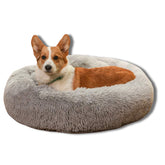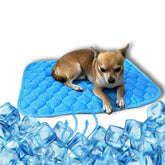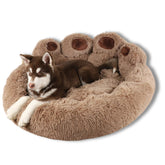Top 5 Things Every New Pet Parent Should Know
Bringing a new puppy home is an exciting milestone that marks the beginning of countless joyful moments, tail wags, and snuggles. However, alongside the excitement comes the responsibility of ensuring your furry friend grows up healthy, happy, and well-adjusted. Whether you’re a first-time dog owner or adding a new puppy to your family, preparation and knowledge are key. Here are the top 5 things every new puppy parent needs to know:
1. Puppy-Proof Your Home
Puppies are naturally curious and love to explore their surroundings, often with their mouths. Before your new furry friend arrives, it’s essential to puppy-proof your home to keep them safe and protect your belongings.
- Remove Hazardous Items: Ensure that electrical cords, household cleaners, small objects, and toxic plants are out of reach. Puppies are notorious for chewing on anything they find, so securing these items is vital to prevent choking, poisoning, or electric shock.
- Secure Valuables: Shoes, remote controls, and furniture corners can quickly become chew toys for teething puppies. Store valuables out of reach or invest in puppy deterrent sprays to make them less appealing.
- Create a Safe Space: Designate a specific area for your puppy where they can play and rest comfortably. A puppy pen or gated-off section of a room filled with toys, a cozy calming dog bed, and water will give them a secure and soothing place to explore. A calming bed helps reduce anxiety and ensures your puppy feels safe and relaxed during their downtime.
- Block Access to Unsafe Areas: Use baby gates or puppy barriers to prevent your pet from entering rooms that might contain hazards, such as the kitchen or bathroom.
- Keep Trash Bins Secure: Puppies are known for getting into trash bins and ingesting harmful items. Invest in trash cans with lids or keep them in cabinets to avoid accidents.
2. Prioritize Socialization and Training Early
Training and socialization are cornerstones of raising a well-behaved dog. Starting these practices early will set the foundation for your puppy’s behavior as they grow.
- Basic Training: Teaching your puppy basic commands like “sit,” “stay,” “come,” and “leave it” not only makes them easier to manage but also strengthens your bond. Positive reinforcement is the most effective method, rewarding them with treats, praise, and play when they do well.
- Socialization: Introduce your puppy to different people, other dogs, and various environments to help them become comfortable in new situations. The critical window for socialization is between 3 to 14 weeks of age, so taking advantage of this time frame is crucial. Exposure to different sights, sounds, and experiences helps prevent fearfulness and behavioral issues later in life.
- Short and Fun Training Sessions: Keep training sessions short and enjoyable, around 5-10 minutes each, to maintain your puppy’s interest and prevent frustration.
- Enlist Professional Help if Needed: If you find training challenging, consider enrolling in a puppy training class or working with a professional trainer to guide you through the process. Many trainers offer group classes, which also provide additional socialization opportunities.
- Be Consistent: Ensure everyone in the household uses the same commands and training methods to avoid confusing your puppy.
3. Invest in Quality Nutrition
A well-balanced diet is essential for your puppy’s growth and overall health. Not all dog foods are created equal, so choosing high-quality food tailored to your puppy’s breed, size, and nutritional needs is important.
- Puppy-Specific Food: Make sure to select food specifically formulated for puppies. These foods contain the right balance of protein, fat, vitamins, and minerals to support healthy development.
- Monitor Portion Sizes: Puppies have smaller stomachs and need to be fed smaller, more frequent meals. Overfeeding can lead to obesity, while underfeeding can hinder growth. Consult your veterinarian for recommendations on portion sizes and feeding schedules.
- Hydration Is Key: Always ensure that your puppy has access to fresh water. Dehydration can lead to serious health issues, especially when they are active and playful. Check their water bowl regularly to make sure it is clean and filled.
- Limit Treats and Table Scraps: While treats are great for training, too many can upset your puppy’s stomach or contribute to unhealthy weight gain. Be mindful of using low-calorie, puppy-safe treats and avoid giving them table scraps that could be toxic or unhealthy.
- Consult Your Vet for Specific Needs: Depending on your puppy’s breed, size, and any health conditions, their dietary needs may vary. Your veterinarian can help you choose the best type of food and supplements for your puppy’s optimal growth.
- Gradual Diet Changes: If you need to switch your puppy’s food, do it gradually over a week by mixing the new food with their current food to avoid digestive upset.
4. Provide Plenty of Mental and Physical Stimulation
Puppies are bundles of energy and need both physical and mental exercise to stay healthy and prevent unwanted behavior. Boredom can lead to chewing, digging, barking, and other destructive habits.
- Daily Exercise: Short walks, play sessions, and backyard romps help release energy and strengthen muscles. The level of exercise should be appropriate for their age, breed, and energy level. For example, a high-energy breed like a Border Collie will need more activity than a smaller breed like a Shih Tzu.
- Interactive Toys and Puzzles: Mental stimulation is just as important as physical exercise. Toys that challenge your puppy to work for treats, such as puzzle feeders and interactive games, keep their minds sharp and engaged. This type of stimulation helps develop problem-solving skills and can keep your puppy occupied when you’re busy.
- Social Playtime: Setting up playdates with other vaccinated puppies or dogs can provide much-needed social and physical stimulation. Just be sure the play is monitored to avoid overwhelming your pup. Social play also teaches them how to interact appropriately with other dogs.
- Training as Stimulation: Incorporate short training sessions as part of your daily routine. Practicing tricks, learning new commands, or practicing agility activities can be both mentally and physically rewarding for your puppy.
- Change Things Up: Regularly rotating toys and introducing new activities will keep your puppy from getting bored and help with their cognitive development. Keep a stash of different types of toys, from squeaky toys to tug ropes, to maintain variety.
- Create Mini Challenges: Hide treats around the house or yard for your puppy to find. This game taps into their natural scavenging instincts and provides a fun way to expend energy.
5. Prioritize Regular Veterinary Care
Routine vet visits are a must to ensure your puppy stays on track with vaccinations, deworming, and overall health.
- Vaccination Schedule: Puppies need a series of vaccinations during their first year to protect against diseases like parvovirus, distemper, and rabies. Your vet will provide a recommended schedule based on your puppy’s age and health.
- Deworming and Preventative Treatments: Puppies are prone to parasites like worms and fleas. Regular deworming and preventative treatments for fleas and ticks are crucial for their wellbeing. Ask your vet about the best prevention plan for your area, as some regions may have different risks.
- Microchipping and Identification: Consider microchipping your puppy in addition to using a collar with ID tags. Microchipping is a reliable way to ensure they can be identified if they ever get lost. It’s a simple procedure that provides lifelong identification.
- Monitor for Health Issues: Puppies can be prone to certain health conditions. Watch for signs of lethargy, lack of appetite, or unusual behavior and consult your vet if anything seems amiss. Early intervention is key to preventing minor issues from becoming major problems.
- Dental Health: Don’t overlook dental care for your puppy. Brushing their teeth regularly and providing dental chews can help prevent gum disease and bad breath. Get your puppy accustomed to having their mouth handled early on to make future dental care easier.
- Spaying or Neutering: Talk to your vet about the appropriate time to spay or neuter your puppy. This procedure can prevent unwanted litters and contribute to better overall health by reducing the risk of certain diseases.
Bonus Tips for New Puppy Parents
- Establish a Routine: Dogs thrive on consistency, so establishing a regular schedule for feeding, potty breaks, playtime, and sleep helps your puppy know what to expect.
- Crate Training: A crate can be a valuable tool for house training and providing a safe space for your puppy when unsupervised. Introduce the crate gradually, making it a positive place with treats and soft bedding. Never use the crate as a form of punishment, as this can make your puppy fearful of it.
- Be Patient and Positive: Puppies are learning everything from scratch. Accidents and setbacks will happen, so patience and positive reinforcement are essential to guide them effectively. Your puppy will respond better to gentle corrections and praise than to punishment.
- Bonding Time: Spend quality time with your puppy through petting, cuddling, and play. Building a strong bond early on helps foster trust and creates a loving, secure relationship. This connection also makes training and discipline easier as your puppy learns to respect and trust you.
- Join a Community: Connect with other dog owners, either locally or online, for advice, tips, and support. Being part of a community can make the journey more enjoyable and informative.
Final Thoughts
Bringing a puppy into your life is an experience filled with love, fun, and learning. By understanding and implementing these key aspects of puppy care, you set the stage for your furry friend to grow up healthy, happy, and well-mannered. The effort you invest in training, socialization, nutrition, exercise, and regular veterinary care will pay off in countless tail wags and joyful moments for years to come. Enjoy the adventure—you’re in for an incredible journey!






